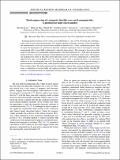Band engineering of a magnetic thin film rare-earth monopnictide: A platform for high Chern number
Author(s)
Inoue, Hisashi; Han, Minyong; Hu, Mengli; Suzuki, Takehito; Liu, Junwei; Checkelsky, Joseph G; ... Show more Show less
DownloadPublished version (1.967Mb)
Publisher Policy
Publisher Policy
Article is made available in accordance with the publisher's policy and may be subject to US copyright law. Please refer to the publisher's site for terms of use.
Terms of use
Metadata
Show full item recordAbstract
©2019 American Physical Society. Realizing quantum materials in few atomic layer morphologies is a key to both observing and controlling a wide variety of exotic quantum phenomena. This includes topological electronic materials, where the tunability and dimensionality of few layer materials have enabled the detection of Z2, Chern, and Majorana phases. Here we report the development of a platform for thin film correlated, topological states in the magnetic rare-earth monopnictide (RX) system GdBi synthesized by molecular beam epitaxy. This material is known from bulk single crystal studies to be semimetallic antiferromagnets with Neel temperature TN=28K and is the magnetic analog of the non-f-electron containing system LaBi proposed to have topological surface states. Our transport and magnetization studies of thin films grown epitaxially on BaF2 reveal that semimetallicity is lifted below approximately eight crystallographic unit cells while magnetic order is maintained down to our minimum thickness of five crystallographic unit cells. First-principles calculations show that the nontrivial topology is preserved down to the monolayer limit, where quantum confinement and the lattice symmetry give rise to a C=2 Chern insulator phase. We further demonstrate the stabilization of these films against atmospheric degradation using a combination of air-free buffer and capping procedures. These results together identify thin-film RX materials as potential platforms for engineering topological electronic bands in correlated magnetic materials.
Date issued
2019-10Department
Massachusetts Institute of Technology. Department of PhysicsJournal
Physical Review Materials
Publisher
American Physical Society (APS)
ISSN
2475-9953